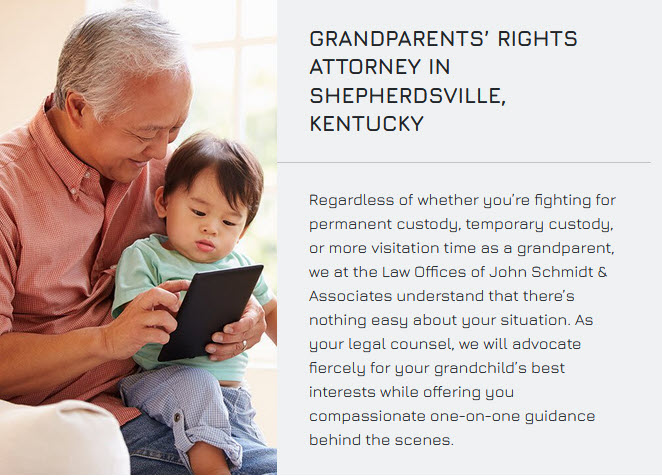Each family in Kentucky has its own unique set of dynamics, but one thing almost always holds true: grandparents adore their grandchildren. When your grandchildren aren’t getting the care and attention they need — or when a legal battle has left one parent trying to keep you away from your grandchildren — you’re left with a serious question: should you pursue legal action?
Answering this question isn’t easy, but it’s extremely important for your grandchildren’s sake. If you believe your grandchild or grandchildren are being neglected or mistreated, or if you’re being denied your visitation rights, now is not the time to worry about stepping on anyone’s toes. Fortunately for grandparents, Kentucky has various laws in place that advocate for the grandparent-grandchild relationship. And fortunately for those of you who live in the Shepherdsville area, you have an experienced advocate of your own in attorney John Schmidt.
When & Why Grandparents Claim Custody
With the southern states being especially susceptible to the opioid epidemic, it’s no surprise that Kentucky currently has one of the highest rates of grandparents stepping in to raise their grandchildren. This, of course, is just one of many reasons a grandparent may feel the need to fight for custody. Others include:
Mental illness
Incarceration
Substance abuse
Military deployment
Unemployment
Death
Depending on your unique situation, it may be in your grandchild’s best interest to fight for permanent custody or temporary custody. For instance, if your child is unemployed and that lack of income is hindering their ability to support your grandchild or grandchildren, you’d most likely want to fight for temporary custody while your child works toward a solution.
We invite you to contact us via e-mail, schedule an appointment or call us today at (502) 509-1490 to get answers to your questions and to learn more about your unique circumstances and how to protect what is most important to you in your family law case.
FAQs about Kentucky Grandparents’ Visitation Rights
As with every other aspect of Kentucky family law, “reasonable visitation rights” for grandparents are awarded based on one sole concept: the best interests of the child. Essentially, Kentucky’s laws regarding grandparents’ rights reflect the idea that, more often than not, children benefit from having more contact with parental and grandparental figures. As a result, your argument for visitation rights is very likely to be supported by the state.
Not sure whether you have a case? Let’s review some of the frequently asked questions by grandparents who are thinking of fighting for visitation:
Can I sue for visitation if my child isn’t divorced? Yes. Kentucky law allows grandparents to sue for visitation even if their grandkids live in an intact family.
My child’s visitation rights have been terminated. Does that affect mine? No. The court views you separately from your child. Even in the event that they are denied visitation, that doesn’t mean you will be too.
My child lost their life. Can I still have visitation rights? Yes. Kentucky law treats grandparents in this situation similar to the way it treats non-custodial parents. You may have visitation rights with your grandchild if you pay child support to help make up for the income they can no longer provide.
What if my grandchild was adopted? If you were awarded visitation rights before your grandchild was adopted, those rights should be honored. If not, the court and adoptive parents may still grant you visitation if they believe it’s in the child’s best interests.
These are, of course, just some of the many questions that may be flooding your mind as you weigh your options. The good news is that you don’t have to try and figure everything out on your own. Our founding attorney, John Schmidt, brings more than 25 years of experience and is here to clearly explain your rights as a grandparent and provide legal guidance through the entirety of your case. Reach out today.
We invite you to contact us via e-mail, schedule an appointment or call us today at (502) 509-1490 to get answers to your questions and to learn more about your unique circumstances and how to protect what is most important to you in your family law case.





